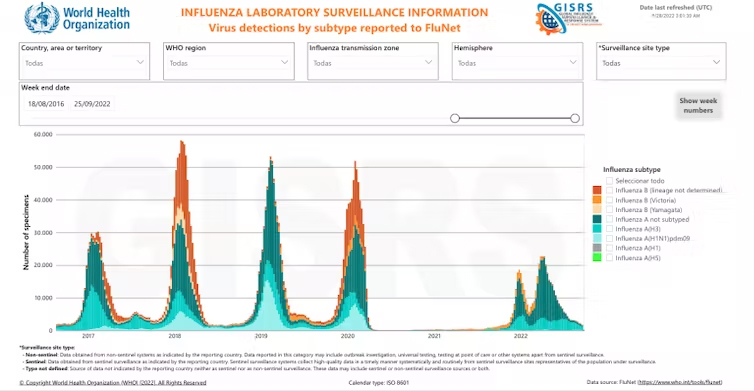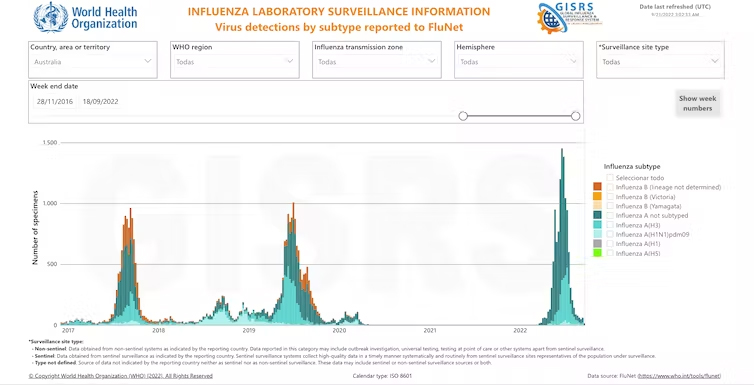29/09/2022
Published in
The Conversation
Ignacio López-Goñi
Full Professor of Microbiology, University of Navarra

We do not know, but it is clear that it is going to be a special year. We have not had a "normal" flu season for two years, because the covid-19 virus has practically wiped out the flu season. to influenza during the pandemic and has changed the global epidemiology of respiratory infections.

In Spain, normally between 30-40 % of the cases of respiratory infections are due to respiratory syncytial virus, whose peak incidence is usually in December. Seasonal epidemics of influenza usually affect 10-20 % of the population each year, of which 20-40 % are children. And the peak of influenza usually occurs in January-February.
However, in a study conducted in our country on the impact of the pandemic on the rate of admissions for respiratory infections in pediatric ICUs (from March 2020 to February 2021), it was found that hardly any cases of respiratory syncytial virus (RSV) or influenza were detected.
Why is this? Most likely, the measures implemented to reduce SARS-CoV-2 transmission - hand hygiene, use of masks, social distancing and reduced travel - have contributed to reducing the transmission of other respiratory viruses. In addition to explaining certain anomalous behaviors, such as the peak of the respiratory syncytial virus between May and June 2020. Flu cases have appeared intermittently, like a trickle, but the virus was virtually wiped out by Omicron last winter.
In Australia, Argentina or Chile it has been advanced, but it has not been too serious
We do not know what this flu season will be like or when it will start, but it may give us some clue to look again at what has happened this winter (summer in Spain) in the southern hemisphere. In general, in countries such as Australia, Argentina or Chile the flu epidemic has come several weeks earlier, but it does not seem to have been a particularly severe season. In Australia, children under five years of age have been more affected and the circulating subtypes have been A(H3) and A(H1). Influenza B subject has not been detected.

Without anti-covid measures there will be more flu transmissions
After two years without a "normal" flu season, it would be logical that this winter there would be more cases of flu than in the previous season, because we have removed all measures against covid-19.
It should also be taken into account that more people are susceptible to the virus because they have not received the antigenic stimulus of previous campaigns.
To make matters worse, influenza antibodies are also declining over time, as is the case with covid-19. In particular, children under five years of age have not received the boost in recent years and we could expect a higher issue of influenza cases.
There are also doubts as to how much this year's flu vaccine will protect against circulating strains. Since we have been flu-free for a couple of years, the match between vaccine strains and circulating strains may be insufficient.
Vaccinating children
We are facing a special winter in which influenza and coronavirus will coincide. There is also concern about the next epidemic of respiratory syncytial virus, the leading cause of bronchiolitis in young children.
We must protect and vaccinate the most vulnerable, with special attention to children. And act with common sense: vaccination remains the best way to avoid serious complications from respiratory viruses.
If you have flu-like symptoms, isolation is best. If you can avoid attend at work, avoid it. And the use of masks and frequent hand washing are highly recommended, especially to avoid transmitting the virus to the most vulnerable.
This article was originally published in The Conversation. Read the original.
![]()
